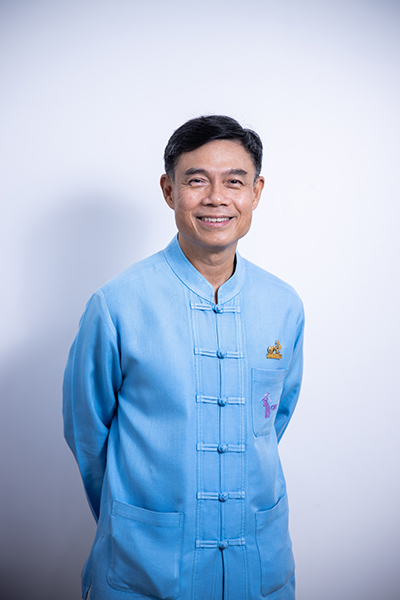There is nothing of particular note to the physical appearance of the cannabis leaf. Yet, its distinctively serrated compound leaves are globally recognisable. For millennia and worldwide, cannabis has been used as medicine; its multiple properties are believed to help cure all manner of illnesses and ailments. The challenge to researchers is how best to utilise this ubiquitous plant, extracting the most value out of it and turning it into a great medical opportunity.
For hundreds of years, Thai people have turned to cannabis, the plant being an integral ingredient in Thai traditional medicine's complex medical portfolio. For example, local herbalists, healers, and doctors have long used the plant to help alleviate aches and aid sleep. However, the plant's more toxic properties affect neurotransmitters and areas of the brain that influence pleasure, memory, thinking, concentration, movement, coordination, and sensory and time perception.
The Public Health Office last changed the legal guidelines in 2021, allowing the use of cannabis for medical and research purposes. Thanks to the new law, cannabis restrictions have been loosened, and a world of possibilities opened up. Nevertheless, Chiang Mai University's researchers still have a fine line to walk, ensuring compliance with the latest directives but still develop and deliver the plant's opportunities.

Setting medical standards and developing technology and innovation
While cannabis, also known as marijuana, contains over 750 chemical components widely known to be of medical relief to cancer patients by helping them sleep and gain appetite, it must be administered by medical professionals, as overdosage can lead to side effects and danger.
Because of Chiang Mai University's multiple fields of knowledge and expertise, all with the potential to respond to societal needs, the university is in the prime position to extract the most value from the plant for medicinal purposes and even possibly commercial purposes. To that end, the Medical Cannabis Research project was established for Chiang Mai University’s medical benefits.
“Research has now indicated that pure marijuana extract helps last-stage cancer patients to enjoy a far better quality of life,” said Professor Pongruk Sribanditmongkol, M.D., Ph.D., Vice President of Chiang Mai University who is in charge of the project. “While the plant cannot cure, its results are undisputed; not only can the extract help patients to sleep and gain an appetite, it also helps reduce nausea and epilepsy while alleviating pain in some cases where standard medicine is ineffective. Our target is to create standards for medical-grade marijuana for safe and optimal consumption. Commercially, this has international potential.”

Professor Pongruk Sribanditmongkol, M.D., Ph.D.
Vice President of Chiang Mai University who is in charge of the project
Embracing this challenging opportunity, the university is focusing multiple resources and tools on this research to develop technology and innovation, focusing on setting measurable standards to respond to societal needs.
Grow. Extract. Cure
Integrated approach from upstream down through downstream
The project conducts research into cannabis for medical benefits. It is a comprehensive research project run under the university's Science and Technology Research Institute (STRI) which will pool a variety of the university's expertise to focus on three areas:
1) Growing and producing: In conjunction with the Faculties of Agriculture and Science and the International College of Digital Innovation, Chiang Mai University, a variety of strains of marijuana will be studied to find optimal growth conditions and develop a product quality control system that optimises quality and quantity.
2) Marijuana chemical extract: The continuation of the research into growth and production delves into the extraction technology required to draw out targeted chemical properties in their purest forms as are necessary for optimal results. A process of evaluation and testing is applied throughout the entire extraction process through the cooperation of the Faculties of Pharmacy, Agro-Industry and Sciences, and the Food Innovation and Packaging Centre.
3) Application for medical use: The Faculty of Medicine then applies the extracts from the previous research into medical usage for patients to meet international food and medicine standards of the World Health Organisation.
The International College of Digital Innovation, then takes on the process of production permission, import procedures, and possession rights for personal usage, and setting up a clinic for studies and research purposes and distribution and sales systems.
To support a potentially large industry in Thailand, the university has also received cooperation from the private sector, with Atlanta Medicare Co., Ltd., assisting in medical research into applied medical-grade marijuana and the development of cosmetic products using marijuana extracts.
Marijuana medical research building
Medical-grade marijuana
An important challenge
While the laws surrounding marijuana have recently been loosened when applied to research and medicine, in practice, the production of medical-grade marijuana must still undergo a process riddled with permissions at every step. Whether it is permission to import seeds, grow, possess for extraction, or sell, these processes are set to create a foundation of standards from which the industry can grow.
“Marijuana is controlled by drug laws,” explained Professor Pongruk. “It is therefore important to ensure that permission is received throughout the entire process. This includes how many seeds to plant, how to extract, and the importance of burning all leaves post-extraction. Medical-grade marijuana is also not allowed to be planted in commercial farms. It must only be grown in controlled settings with strict monitoring of electricity, water, and temperatures.”
“As to extraction and application for sales of extracts, the process is no less daunting with exacting details required, such as the calculation of how many plants produce how many ccs of extracts per bottle – in total five permits are needed for research. Growers must measure exact amounts offering little to no wiggle room for waste. The Thai Food and Drug Administration must then approve the findings through the Public Health Office before the product can be used commercially and for export.”
To date, marijuana extract products have begun to be found in the marketplace and the food and beverage and cosmetics industries. The potential is vast, and Chiang Mai University's team of researchers are working towards supporting the development and growth of this potential.